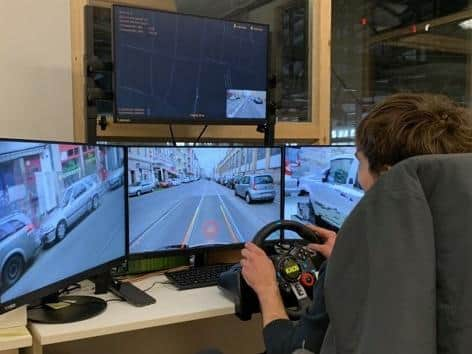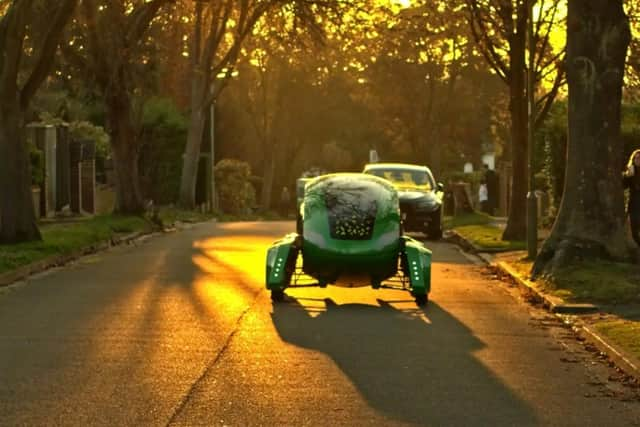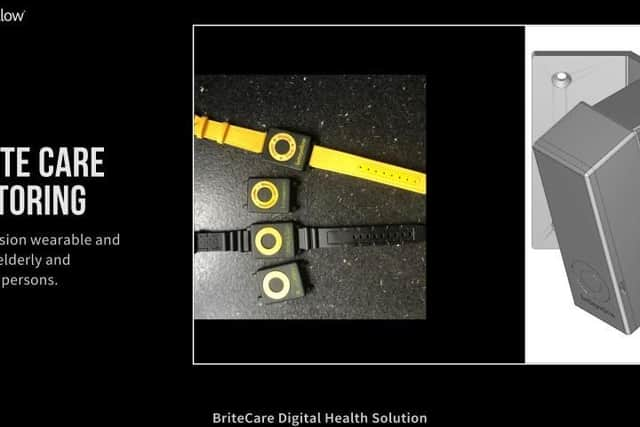Testing begins as first standalone 5G network in the UK is launched in Milton Keynes including remote controlled cars
and live on Freeview channel 276
Look out for more robots and driverless cars in Milton Keynes as a new standalone 5G network will be used to test futuristic technology, starting today (May 26).
Once again Milton Keynes will be the testing ground for more futuristic and novel uses of modern technology.
Advertisement
Advertisement
Trials will be completed testing the ability of this network to power robots, medical devices, driverless cars, and energy saving devices.


The hope is that this mobile internet connection will prove powerful and reliable enough to manage traffic flow, whilst powering up driverless vehicles, among other innovative technology ideas. The technology, if successful, could be used to allow patients to be monitored without having to see a specialist or leave their homes.
The project has been titled MK:5G, the South East Midlands Local Enterprise Partnership (SEMLEP) allocated the funding, chief executive Hilary Chipping said: “This SEMLEP investment has put Milton Keynes in an incredible position, enabling businesses in the city to advance and deploy real solutions to issues and challenges that affect us all. Thanks to MK:5G’s success and innovation, the project has attracted a lot of positive attention and secured additional investment from the government.”
Five businesses have been given specific roles trialling these futuristic technologies.
Advertisement
Advertisement
Fotech, is tasked with developing the smart traffic systems, organisers hope to implement in Milton Keynes. Fotech will be piloting its fibre-enabled, Distributed Acoustic Sensing (DAS) technology along city roads from this summer - to monitor the health of roads and driver behaviour.


Stuart Large, product line director and business development at Fotech, said: "We would like to demonstrate how our technology can be used to reduce congestion and the resultant emissions and fuel consumption, improve road safety, and identify any road defects – ideally before they become visible.
“We plan to integrate our technology with the city’s cameras and other sensors and data sources available in the 5G data hub to build a complete picture, that will allow us to explore applications such as the prioritisation of public buses, detection of stopped vehicles that cause a hazard, improvement of parking management and improvements in highway maintenance.
"By providing data for highway maintenance programmes, Fotech aims to provide cost saving to the council which in turn will be better for road users, as there will be more preventative works and less road closures."
Advertisement
Advertisement
Fotech will also use its technology for cable monitoring - whether protecting against copper cable theft, or data interception, or locating cable strikes or faults.


The Academy of Robotics, will develop self-driving delivery bots, called Kar-go. Through artificial intelligence these machines can deliver packages at speeds of up to 60-miles-per-hour.
William Sachiti, CEO and founder of Academy of Robotics, said: “Kar-go shows how driverless delivery vehicles could eventually become a common site on our streets, delivering parcels directly to homes.
“Having incredible Wi-Fi connection, thanks to MK:5G, will mean we can control remotely and monitor every aspect of what we are seeing. Kar-go is designed to travel on unmarked as well as marked roads and thanks to our unique vision system our electric vehicle is capable of delivering packages and parcels to addresses not just in city-centres, but also to suburban and rural locations.“
Advertisement
Advertisement
These driverless pods can also cover 60 miles on one charge and has been designed to carry small, shoe-boxed sized parcels.
Imperium Drive, is a business which will be focusing on a different kind of driverless vehicle. The technology this company oversees, is often referred to as ‘teleoperation’, it allows a human operator to remotely connect to and drive any automated vehicle using live video and sensor feeds over a cellular network.
Koosha Kaveh, Co-Founder & CEO of Imperium Drive, said: "Autonomous mobility is set to be worth $500 billion across the globe by the year 2025 and it is the development of remote driving technology that will be the essential ingredient to unlock this huge opportunity
"That is where we come in and, thanks to the MK:5G project, we are looking forward to trialling our technology with various automated vehicles across Milton Keynes later this year."
Advertisement
Advertisement
Briteyellow, is an app and wearable smart device designed to prevent indoor accidents and save lives, it is set to be rolled out in Milton Keynes later this year.
Briteyellow, is also the name of the Cranfield-based company which specialises in interactive and wireless communications. It will be using the city’s new 5G technology to trial its BriteCare device in Milton Keynes care and residential homes.
The device tracks the movements of vulnerable and elderly people in their homes and uses Artificial Intelligence to identify anomalies and send alerts to carers.
The system is made up of an app and wrist sensor, which looks similar to a watch.
Advertisement
Advertisement
Briteyellow founder and CEO Fredi Nonyelu explained: “We are all about making indoor spaces smart and this new device will allow us to monitor the wellbeing of vulnerable and elderly people in indoor settings. Put simply, it will reduce accidents and save lives. BriteCare will enable early intervention and bring peace of mind and assurance for both carers and people in need.”
Fredi added: “It is thanks to the new 5G technology that we are trialling this in Milton Keynes. 5G means we will be able to provide a secure system to transfer medical data. The speed of 5G also means we can be confident that if a message is sent it will be received and read.”
WarnerPatch, is a device designed to predict disease evolution to reduce emergency re-admissions and surgery is set to be trialled in Milton Keynes.
WarnerPatch, has designed a new product that measures a person’s tissue health, with remote monitoring, meaning patients can be given expert medical advice without leaving their homes.
Advertisement
Advertisement
The company, includes a multi-disciplinary team of clinicians, engineers, and business staff. Dr Melissa Berthelot explained: "Our product uses our proprietary sensor placed on the body, which detects tissue health. Data goes back to the treating clinical staff and patient which means that although patients are not in control of their disease, they are in control of monitoring themselves from home and this is truly empowering.
“If the sensor detects a problem, it will immediately notify the patient’s medical team, for an early clinical assessment, rather than wait for the next scheduled appointment. In these cases, just one day can make a huge difference to recovery and survival.”
This product is set to be trialled in Milton Keynes in the next 18 months.
Brian Matthews, head of transport innovation at Milton Keynes Council, added: “This is a huge and important step in Milton Keynes’ journey to becoming a cleaner, greener and a smarter city. The new technology brings several significant benefits, ranging from managing traffic flow to providing better healthcare."